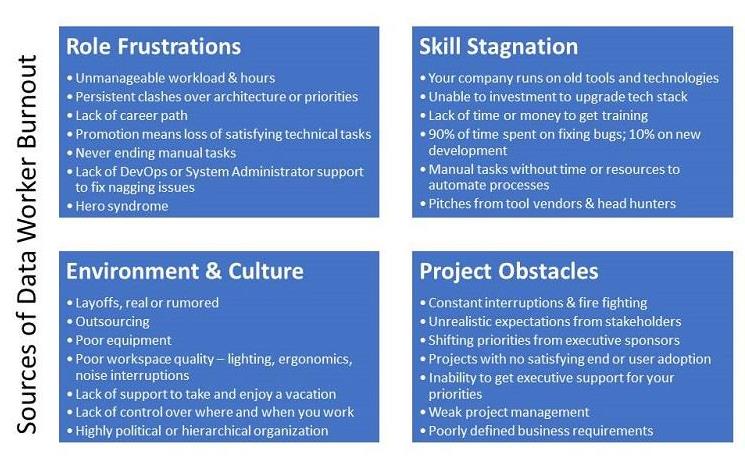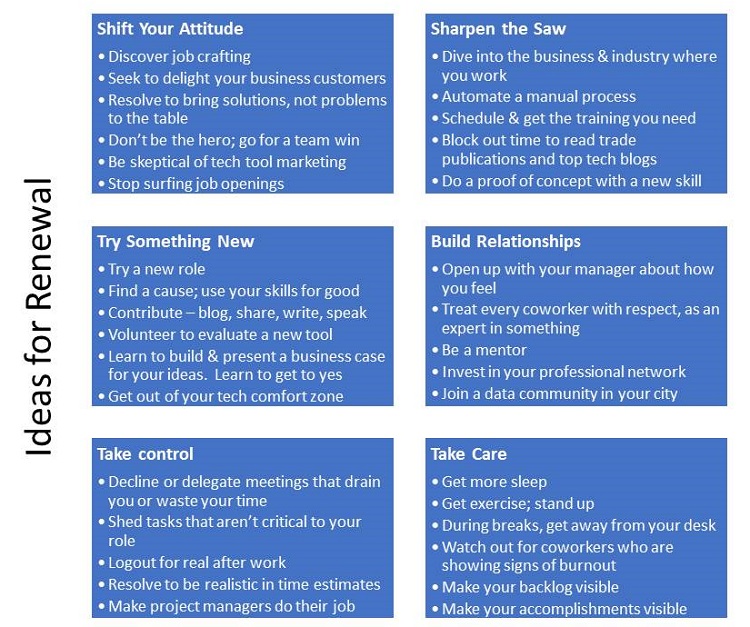
33 Ways Data Workers Can Beat Job Burnout
The WHO officially designated employment burnout as a medical condition. Data-related jobs bring a unique set of stresses and challenges that can contribute to this problem. Here are 33 ways data workers can use to beat their unique flavor of burnout and renew their careers.
- By Stan Pugsley
- July 12, 2019
Have you ever felt completely unmotivated and disenchanted with work? Perhaps you have seen a peer or direct report sink from being a positive force to being a negative force at work. Burnout affects every team and is so common that recently the World Health Organization (WHO) officially designated employment burnout as a medical condition. In their diagnosis, WHO offered four useful symptoms to look for in yourself and your teammates.
- Energy depletion
- Mental distance from one’s job
- Feelings of negativism or cynicism
- Reduced professional efficacy
Every job is stressful and tiring, but those who work with data are often especially vulnerable to burnout. Data workers, along with engineers in other fields, tend to have more analytical personalities and can be more sensitive to stress at work. They deal with detailed processes that may not be visible or appreciated by management or other departments. Because data is often an invisible, intangible asset, it is often overlooked as a true company resource -- so how can working with data be stressful?
The following list identifies many of the forces that may cause burnout in data workers.

Note that some of the items in each section may be easily resolved with a proactive conversation with management, such as poor ergonomics at your desk or the perception that your job is at risk due to outsourcing. Other issues are more likely a permanent characteristic of your job, such as the lack of a clear career path when you are the only analytics staff member at your organization. Some issues may only be solvable only if you change jobs -- such as to escape a highly political environment. Some issues, such as learning to set proper expectations with stakeholders, are personal improvement opportunities and should be resolved while staying at your current job.
When looking for solutions to burnout, we’ll focus on those within an individual employee’s sphere of control. Here is a list of 33 ideas to renew your energy and attitude, followed by comments about each category.

Shift Your Attitude
Often when we adjust our own attitude, we find that other issues are resolved in the process. A good example is the concept of “job crafting” in which, rather than waiting for management or HR to hand us the job we desire, we get creative and start to create that dream job for ourselves. You can cultivate and expand the parts of your job that you most enjoy and minimize the parts that you least enjoy. You can start today by showing your boss how valuable your most interesting and fulfilling tasks are and outline the potential business benefits the organization might enjoy if you could commit more time to them.
After enough years in the same role, it is difficult for anyone to maintain a positive, constructive attitude all the time. We must make an effort to stop playing the role of critic in meetings and instead become a problem solver. Data workers tend to focus too much attention on technical tasks and too little on the business stakeholders, leading to a cycle of friction. Your relationship with stakeholders can become a source of energy and excitement if you spend time and effort understanding their processes and shadowing them while they work.
An important part of improving our attitude is identifying and eliminating triggers that bring out negative thoughts. Surfing job openings is a sure way to feel distracted from the positive aspects of your current job. Listening to every marketing pitch from technology vendors will convince you that there is a magical solution out there. Although you should be aware of the job market and new data tools, be mindful of their potential to shift your attitude toward your current job and tools.
“Hero syndrome” represents a good attitude taken to an extreme level and has the potential to cause burnout. The hero believes he or she is the only person standing between success and disaster for your analytics or BI department; no one else on the team can possibly help or fill the role. The hero syndrome leads to working long hours, resisting delegation, and riding an emotional roller coaster as project success becomes linked with personal worth.
Sharpen the Saw
Stephen Covey used the phrase sharpen the saw to mean “preserving and enhancing the greatest asset you have -- you.” It means that you start working smarter instead of just working harder. For data workers, it means taking a proactive approach to staying current with industry trends such as AI and big data architectures, completing training on new skills, and learning everything you can about the industry of your employer. It also means sharpening skills by taking on new technology challenges and automating manual data processes that trap us in a never-ending cycle of copying and pasting data from one application to another. Sharpening the saw means stopping doing busywork and giving ourselves time and resources to evaluate whether there is a better way to do things.
Try Something New
If you are feeling stagnant in your skills or career path, look around and find new directions for growth. Within your organization, be aware of new initiatives, projects, or technologies and put in extra hours to demonstrate that you are the right person to lead the charge. If your organization is also feeling stagnant, look outside work for chances to volunteer or contribute to something you value. Nonprofits often struggle with website analytics, system implementation, and data integration projects and may welcome a volunteer resource.
Build Relationships
At the beginning of a data-centered career, the focus is often on building technical expertise. As your career progresses and you feel a plateau in technical skills growth, realize that that is normal and not a sign of stagnation. The next dimension of your career is to develop relationships and business awareness. Relationships require investment of time and money, but over the long term they are even more important to career progression than any single technical skill. Find a mentor; be a mentor. Contribute to a community before you ask for anything in return. Treat your manager and peers with respect and openness with the goal of developing a network of friends and colleagues that will last your entire career.
Take Control
Analytical or amiable personalities are common on data teams, and those personalities tend to avoid confrontation and may seek refuge from confusion around them by taking on technical tasks. Avoidance of confrontation can lead to burnout as you work longer and longer hours and deal with constant interruptions and firefighting. It is much easier to have hard conversations up front, with the help of a project manager, than to say “yes” to every request and deal with the stress and anger that may follow if you put in extra time and effort and still fail to meet expectations.
If you feel burned out and find yourself watching your productivity eroding at work or your work/life balance eroding at home, talk to your manager, a mentor, or a friend and get support to take back the control you need to enjoy work again.
Take Care
We have all heard the advice about sleeping more, getting more exercise, and giving ourselves a break during the day. Nobody is going to step in and fix those things for you. You are ultimately responsible for taking care of yourself and protecting yourself from any type of abuse at work. What you may not have thought about, though, is raising the visibility of your successes and backlog tasks so that others can take a more active role in taking care of you.
Visibility comes through communication -- by email, agile sprint board, project milestone accomplishments, or in meetings. Communicate clearly when you complete tasks, give the business context for why it matters, and tell people where their request sits in your backlog.
We all play a role in boosting the morale and engagement of people around us. Take care of everyone in your sphere of influence and accept the help of others around you. We are all in this together!
About the Author
Stan Pugsley is an independent data warehouse and analytics consultant based in Salt Lake City, UT. He is also an Assistant Professor of Information Systems at the University of Utah Eccles School of Business. You can reach the author via email.